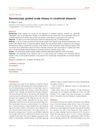Primary Scarring Alopecia: Clinical-Pathological Review of 72 Cases and Literature Review
January 2017
in “
Skin appendage disorders
”

TLDR The conclusion is that primary scarring alopecia is a complex condition that requires early and accurate diagnosis for effective treatment.
The study analyzed 72 cases of primary scarring alopecia (PSA) and found that it is a severe condition with high clinical and histopathological variability, making diagnosis and treatment challenging. The majority of patients were European-Caucasian females, with lichen planopilaris (LPP) and frontal fibrosing alopecia (FFA) being the most common diagnoses. Treatments included topical corticosteroids, systemic therapies, and 5% minoxidil during remission. The study highlighted the importance of early and accurate diagnosis to prevent progression to irreversible fibrosis and the usefulness of dermoscopy and scalp biopsy in diagnosis. Lymphocytic scarring alopecias (LSAs) mainly presented as follicular and multiple patches, with LPP being the most frequent. Nonspecific scarring alopecia (NSA) was more common in females and often presented as pseudopelade, with less satisfactory treatment options. The document concluded that accurate clinical-pathological correlation is essential for diagnosis and that early referral for dermatological assessment is crucial for proper treatment and patient quality of life.








